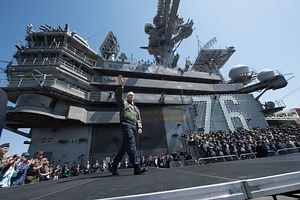Has the Trump administration developed, over the past two weeks, a doctrine that emphasizes maintaining a robust reputation for resolve that will make its feel secure and its enemies shudder in terror? According to advocates of a robust view of credibility, a belief that the United States will act militarily to enforce its commitments changes the behavior of potential foes; believing in the strength of U.S. resolve, they will believe in the credibility of U.S. commitments. With that in mind, let’s review the events of the past two weeks.
On April 6, 59 unmanned cruise-missiles, launched by U.S. destroyers operating safely in the Mediterranean, struck a Syrian airbase and reduced the sortie rate of the Syrian Arab Air Force for an indeterminate period of time. This act restored American credibility, as these missiles were distinguished from the hundreds of bombs and missiles that the Obama administration had fired on Syrian targets because reasons, reasons associated with the fact that Trump, having given no warning to Syria that he might strike in response to a chemical weapons attack, gave considerable warning to the Russian government (and by extension its Syrian proxies) shortly before the missiles launched.
Similarly, last week the United States dropped an 11-ton bomb out of the back of a cargo plane against ISIS forces in Afghanistan, an enemy with no air defenses to speak of. This, more than the thousands of bombs that the United States has dropped on Afghanistan over the past two decades, helped establish the credibility of U.S. resolve towards North Korea, a country which does have air defenses and which can shoot down any aircraft capable of carrying a MOAB. As a New York Times analysis dryly noted,
While some analysts said the bombing sent a stern symbolic message to Syria and North Korea, it has little real utility against those countries, or Iran or Russia, because it is pushed out of a lumbering cargo plane that can operate safely only over nations that have no effective air defenses or air forces.
Finally, the United States Navy diverted the Carl Vinson carrier battle group to the vicinity of the Korean Peninsula in order to back up Vice President Mike Pence’s threats, and to restore the credibility of the U.S. deterrent against North Korean missile launches, nuclear tests, and general assorted skullduggery. Unfortunately, a communications snafu apparently led to confusion regarding how and when the Vinson battlegroup was arriving in the Korean theater. This has led to heavy criticism in both the U.S. and East Asia, accusing the Trump administration of some combination of perfidy and incompetence regarding the deployment of its aircraft carriers. And of course, it’s unclear whether North Korea had any idea of where the Vinson was during this period.
Here’s the real point: the politics of credibility are complex and ephemeral, and spending time, blood, and treasure to try to manufacture a reputation for toughness is, more often than not, a fool’s game. And foreign policy analysts probably shouldn’t encourage neophyte policymakers to use cruise missiles, aircraft carriers, and MOABs to chase “credibility” around the Pacific Ocean.

































